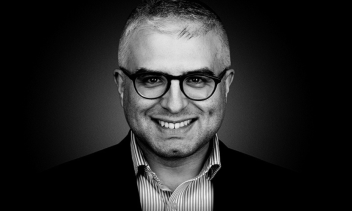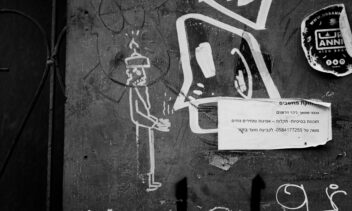“To the believer, there are no questions; to the skeptic, no answers.”
Whoever so brazenly wrote those words clearly didn’t spend enough quality time with believers. As the creator of Seekers of Unity—a YouTube channel and community exploring the world’s mystical traditions—I’ve found quite the opposite: Believers are full of questions. In fact, the greater the believer, the deeper the questioning—and times like these bring a torrent of questions raging to the fore.
They started as whispers on Simchat Torah morning: Did you hear what happened in Israel? Why did the rabbi interrupt services to pray for our brothers and sisters in the Holy Land? What had happened? During Yizkor, we left shul and huddled around the security guard’s screen in silence. In the wet Miami heat, we watched the sickening news.
Times like these bring questions, burning, scathing questions. Friends reached out to me with theirs. I shared the same questions.
They came in waves: shock, fear, anger, rage, numbness, denial, confusion, pain. But that night we danced. We danced with the Torah. We danced through our tears. We danced for those who could no longer dance.
When the holiday ended, I called and messaged all my friends and family in Israel. From what I gathered, they were all safe. A sigh of relief. I prayed for my friends who were called up to protect innocent lives. For their young wives, and sweet children. Then I called home to speak with my parents. They told me that our friends Tamar and Yonatan had been killed. Their three sweet children, Shachar, Arbel, and Omer, all killed.
We sat and cried. We haven’t really stopped crying, only taken amnesic breaks to “keep face” for others. And then I remember their faces, the Shabbatot and chagim they spent in our house, and the tears return. They were family. They are family. It hurts, hurts so much that they’re gone and no longer with us.
Times like these bring questions, burning, scathing questions. Friends reached out to me with theirs. I shared the same questions.
As a young teenager growing up in an Australian Chabad community, I was fascinated by “belief”—by the questions we ask of it; the questions it asks of us; and the way in which we humans across cultures have posed similar questions to the heavens and received or constructed similar answers in response.
The area of inquiry where I found this commonality to be the clearest was in the realm of mysticism. As a youngster, I discovered that mystical traditions across the globe—despite typically being quite secretive, esoteric, and arcane—shared many of the same questions and, often, many specific parallel answers. As William James put it in his 1902 classic The Varieties of Religious Experience, any serious, thinking person is forced to wonder just how they got so unanimous.
The story shared by mystics across cultures goes something like this: There was One which became Many, for the One desired to gaze and be gazed at, to know and be known, to love and be loved. The One took a painful journey from unity to multiplicity so that the One might journey back to a more wholesome unity that integrates complexity and multiplicity. The mystic tasks us to integrate the psyche, the cosmos, and the divine back into a cohesive, healed whole, face-to-face, whether we like it or not. This, in a nutshell, is the story and task of the human, as far as the mystic is concerned. An ineffable story that they’re forced to speak, compelled by their most profound personal experiences.
I found comfort and fell in love with this story and spent the next decade of my life reading it. I researched it from every conceivable angle: history, philosophy, theology, mythology, poetry, psychology, neuroscience, and critical scholarship. I spent the next few years pondering, articulating, and sharing the story. It’s been a good time. It’s brought me into dear friendships with some of the finest educators and scholars in the field, and with tens of thousands of beautiful fellow seekers who, each month, come to learn, explore, and seek together via my YouTube channel, Seekers of Unity.
The story of the mystics made a lot of deep sense to me, but it also left me with a bag full of questions: What of the God of my childhood who hears and answers prayers, heals the sick, and comforts the mourning? A patriarchal, monarchical, anthropomorphic, transcendent Person. An Entity existing somewhere way out there beyond the clouds, ruling over us down here below? Where did He fit into this picture?
If God is everything, as the Jewish mystics and their brethren across traditions affirm, then God was no longer a Person in the sky watching over me, into whose arms I could place my worries and fears and take faith in His intervention and salvation. And on a less theological note: If everything is One, why does it feel so broken? Why do I feel so lonely and isolated? Why is there so much darkness? Where’s the bliss, the sweetness and softness that the mystics speak of in the heart of every moment? Why don’t I feel it?
These are all very real questions that bothered me for years, and still do. In times like these those questions come back with a vengeance. They sting as they bubble to the surface of my mind.
I used to have a God I could turn to in times of distress, who gave meaning to a cold and indifferent universe, who would hear my prayers and answer them, who would protect us from the enemy.
When He failed to show up and put an end to the slaughter of His children, that prayer turned into protest: If You are the Judge of this world, would You not do justice? When Your children used your name to justify their injustice, would You not rather have your name erased? Are you not the God who refuses to be praised while Your children drown? How then can I now praise You?
The God of my understanding makes steep demands upon me. And it is I, it is You, who must face them.
This believer has questions. My religious convictions no longer allow me to hope that Someone Else will come save me. My conviction that the One became Many so that we might become One again, leaves me in a terrible place. It leaves me responsible for the world I create. It places the war between good and evil not somewhere far out there but deep within. It forces me to face my own broken, jagged darkness, my pain and loneliness with the understanding that it is part of the One and it is upon me, upon us, to heal and integrate it. To make God whole again.
The God of my understanding makes steep demands upon me. And it is I, it is You, who must face them.
We are called to imitate God with divine proportions of grace and compassion. We are called to be Godly and create worlds, worlds of kindness. The only thing stopping us is the belief that we can’t (Shabbat 133b; Bereshit Rabbah 98:3).
I wish the God of my childhood was still there. I wish I could feel safe knowing that He’s running the show and has everything under control. I wish I could pray to Him and have his mighty outstretched arm protect me. As an adult, I can no longer pray to a God who has the capacity to put an end to this suffering and yet chooses not to.
Against my better moral judgment, I still do pray to You as a child. As a child that needs a parent. I also pray as an adult. I pray for moments of silence and stillness in a maddening world. I pray in those moments that I might remember my truest will and highest aspiration, and pray for the courage to make them real in my world.
In the place of despair, helplessness, and resignation, I’m forced to believe that if I can unite my inner world, and bring peace to my raging heart and mind, then, perhaps, that peace will radiate outwards and bring healing to the world outside me, a reflection of my inner world, barely separated by a thin, permeable veneer.
I cannot call upon a miracle. I can only aspire to change myself, and even that would be a miracle. Perhaps from there, my peace would radiate outwards. Perhaps the ripple effect of each of us working to heal and integrate ourselves would radiate a change that would be of messianic proportions. Perhaps the world is, after all, only a conglomerate of individuals, each one affecting the whole.
This believer has questions. You probably have some too. Let us gather our questions. Perhaps we’ll be able to take some meager shelter in their shadows.
Zevi Slavin is a writer, teacher and content creator. He’s the creator of Seekers of Unity, a YouTube channel and online community of 40,000+ exploring the unity of the world’s mystical traditions and the intersection of philosophy and mysticism, east and west, ancient and contemporary, in the hopes of creating a more intimate world together.








